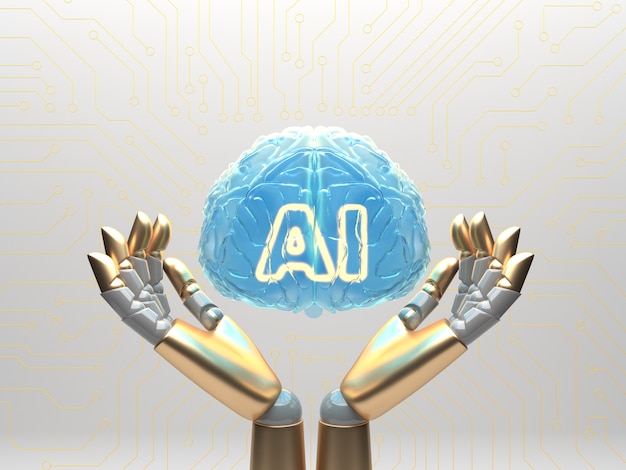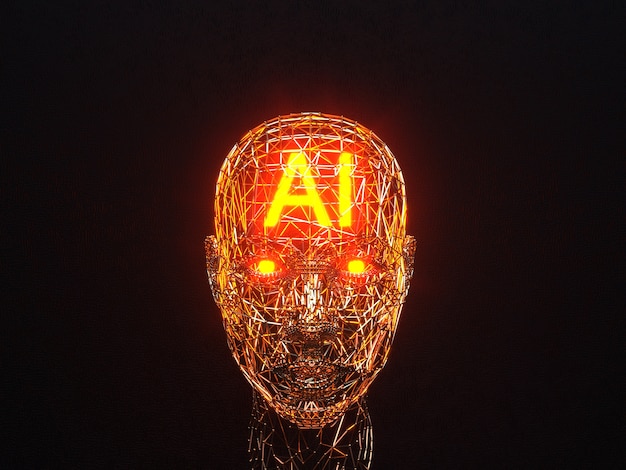Introduction
The scientific vision that once separated artificial intelligence (AI) from our daily lives has disappeared. AI has quickly become ubiquitous, transforming various industries and the world as we know it. Its influence on sectors such as healthcare, finance, transportation, and entertainment is undeniable. In this blog, we will explore 5 Ways AI will Rule the Future , highlighting its incredible potential, as well as the inevitable challenges it will pose.
Chapter 1: The Positive Side of AI Dominance

1. Enhancing Efficiency
Fact: Did you know that AI-driven robots have reduced defects in manufacturing by up to 50%?
AI has significantly improved efficiency across different sectors. For instance, in manufacturing, robots and AI-driven systems have optimized production lines, resulting in reduced operational expenses and increased output. This efficiency also extends to logistics and supply chain management, where predictive algorithms optimize routes, reducing waste and energy consumption.
2. Healthcare Advancements
Example: Meet IBM’s Watson, an AI that can read and understand medical literature. It has the potential to suggest treatments for cancer patients, offering physicians an invaluable resource.
The healthcare industry has seen remarkable progress with the help of AI. AI technology has made it possible to diagnose diseases with high accuracy and discover new drugs. By processing vast amounts of data, AI has enabled quicker and more precise diagnoses, ultimately leading to better patient outcomes. Robotic surgeries are yet another advancement in the field, offering precision and minimally invasive procedures.
3. Personalized Experiences
Fact: Amazon attributes 35% of its revenue to its AI-powered recommendation system.
AI-powered solutions are becoming commonplace in industries like marketing and e-commerce, giving users extremely tailored experiences. Customized product suggestions are generated by analyzing user behavior and preferences through the use of AI-powered recommendation systems. Users are more satisfied as a result, and companies see an increase in revenue.
4. Advancements in Education
Example: Khan Academy, an online education platform, uses AI to adapt lessons to individual students. It personalizes learning paths, ensuring no one is left behind.
AI-driven education platforms are revolutionizing the way we learn. These platforms offer tailored learning paths, adapting to individual student needs. They can also aid teachers in evaluating and addressing the unique needs of each student.
5. AI: A Green Ally
Fact: AI has the potential to reduce worldwide greenhouse gas emissions by up to 4% by 2030.
AI is crucial in solving environmental problems. Agriculture benefits from AI sensors and drones that optimize crop health and resource usage. AI also improves climate modeling and prediction, fighting climate change more effectively.
Chapter 2: The Dark Side of AI Dominance

1. Job Displacement
Fact: The World Economic Forum predicts that AI and automation could displace 75 million jobs by 2025.
The rapid advancement of AI technology and automation has become a pressing issue, leading to a significant loss of jobs across various industries. AI-driven systems are capable of performing routine activities more efficiently than humans. Even though AI may create new job opportunities, reskilling the workforce is necessary to avoid job losses. Therefore, it is imperative to address this issue by retraining the workforce and preparing them for the new demands of the job market.
2. Data Privacy Concerns
Example: The Facebook-Cambridge Analytica scandal exposed how personal data can be exploited for political gain, raising serious data privacy concerns.
The effectiveness of Artificial Intelligence largely depends on the data it uses, but collecting and using this data can lead to significant privacy concerns. It can be difficult to differentiate between personalization and intrusion, and many businesses have experienced data privacy crises as a result. Ensuring that personal data is only used with proper authorization is a critical aspect of AI governance.
3. Bias and Fairness
Fact: In 2018, Amazon abandoned an AI recruiting tool due to gender bias. It favored male candidates over female ones.
AI systems can inherit biases from their training data. These biases can lead to discriminatory outcomes, particularly in employment, lending, and criminal justice systems. Addressing and eliminating biases in AI systems is a complex challenge that requires continuous monitoring and improvement.
4. Security Risks
Example: Cybercriminals use AI to automate cyberattacks, making them more sophisticated and harder to detect.
Artificial Intelligence (AI) has the capability to be both beneficial and detrimental to cybersecurity. While AI is employed by security professionals to detect and counteract threats, cybercriminals may also leverage it to launch cyberattacks. The traditional cat-and-mouse game between cybersecurity experts and hackers is evolving, with AI playing a crucial role for both parties.
5. Ethical Dilemmas
Fact: Autonomous vehicle programmers face ethical dilemmas about the ‘trolley problem.’ Should AI choose to protect the driver or pedestrians in an accident?
As artificial intelligence (AI) systems become more advanced, ethical dilemmas arise. One such example is the question of how AI in self-driving cars should make decisions in life-or-death situations. The use of AI in healthcare also raises moral concerns about the confidentiality and use of patient data, as well as end-of-life decisions.
Chapter 3: The Human-AI Collaboration

.
1. AI as the Ultimate Teammate
Example: Take the world of chess. In 1997, IBM‘s Deep Blue defeated world champion Garry Kasparov, marking the dawn of AI’s dominance. Fast forward to 2021, and we have something extraordinary—AI-powered chess engines helping human players improve their skills.
AI is not only taking over, but it is also becoming a crucial ally. It collaborates with people to enhance their skills in various fields, such as creative arts and healthcare. AI improves our decision-making abilities, provides us with new perspectives, and gives us valuable insights.
2. Unleashing Creativity
Fact: AI-generated art is now a thriving industry. In 2021, a digital artwork created by an AI sold for a whopping $69 million at auction.
It has been commonly believed that creativity and the arts are exclusive to humans. But, advancements in AI technology are challenging this notion. AI systems are now capable of creating poetry, art, and even music. By working alongside writers, singers, and artists, AI is expanding the creative possibilities for humans. It’s not a matter of humans competing against robots, but rather a collaboration between humans and machines.
3. AI Ethics and Governance
Fact: The IEEE Global Initiative on Ethics of Autonomous and Intelligent Systems is working on developing a framework for ethically aligned AI.
As AI becomes more prevalent, reliable governance becomes increasingly important. Organizations worldwide are establishing standards to ensure ethical boundaries are maintained, as ethical concerns hold immense significance. This continuous dialogue demonstrates our commitment to upholding moral principles in this AI-driven society.
4. AI Ethics and Governance
Example: In 2017, Google introduced the “Lookout” app, which uses AI to help visually impaired individuals identify objects and text through their smartphones.
AI has become a powerful tool for fostering inclusivity and creativity. By enabling accessibility solutions powered by AI, individuals with impairments are able to access and experience the world more fully. For instance, AI-powered picture identification and speech recognition software are two examples of how these technologies are lowering barriers and promoting greater inclusivity in our society.
5. The Quest for AGI
Fact: Artificial General Intelligence (AGI), where AI can perform any intellectual task that a human can, remains a frontier yet to be conquered.
As we advance towards AI supremacy, our ultimate goal is to achieve Artificial General Intelligence (AGI). AGI would enable AI to reason, learn, and understand the world in a way similar to humans. However, reaching AGI also brings up complex existential and ethical concerns that require careful consideration.
Chapter 4: FAQs About AI Dominance

Q1: What powers the AI revolution?
A: AI’s rapid growth is driven by increased computing power, access to vast datasets, and advancements in machine learning algorithms.
Q2: Can AI benefit small businesses and startups?
A: Absolutely! AI can level the playing field by automating tasks, providing insights, and enhancing customer experiences.
Q3: How can individuals prepare for AI’s impact on employment?
A: Develop skills like problem-solving, creativity, emotional intelligence, and digital literacy. Adaptability and lifelong learning are key.
Q4: Are there efforts to address AI bias and fairness?
A: Yes, organizations and researchers are actively working to reduce bias, enhance transparency, and ensure fairness in AI systems.
Q5: What’s the role of government in AI regulation?
A: Governments are recognizing the importance of AI regulation to protect citizens, ensure safety, and promote fairness, especially in data privacy, ethical AI, and cybersecurity.
Q6: Can AI help combat climate change?
A: Yes, AI aids in climate modeling, prediction, and resource optimization, offering a crucial tool in the fight against environmental challenges.
Q7: How can individuals protect their data privacy in the age of AI?
A: Be cautious about sharing data, use strong passwords, and regularly update privacy settings on online platforms.
Q8: Is AI a threat to humanity?
A: AI itself isn’t a threat; it’s how it’s developed and used that can pose risks. Ethical considerations are essential.
Q9: What’s the future of AI in education?
A: AI will offer personalized learning experiences, intelligent tutoring systems, and adaptive assessments, transforming traditional teaching methods.
Q10: How can businesses use AI while addressing ethical concerns?
A: By adopting ethical AI practices, being transparent about data usage, auditing AI systems for bias, and actively ensuring fairness in AI applications.
Conclusion
Artificial Intelligence (AI) has established its supremacy in the world today. It is a constant challenge and a dynamic force of change. AI has brought individualized experiences, efficiency, and groundbreaking improvements in fields such as education, healthcare, and the environment. However, we cannot ignore issues such as data privacy, job security, and moral conundrums that come with it.
We must remember that AI is a tool, and not a dictator, as we explore this new frontier. With responsible control, moral behavior, and conscientious growth, we can confront its obstacles and realize its full potential. We are the artists, and the future of AI is a canvas. Together, let’s paint a masterpiece that benefits all people.
Read More : Productivity Overload: The Top AI Tools of 2023

1 thought on “5 Ways AI will Rule the Future: Thriving in the Light and Shadow of Tomorrow”